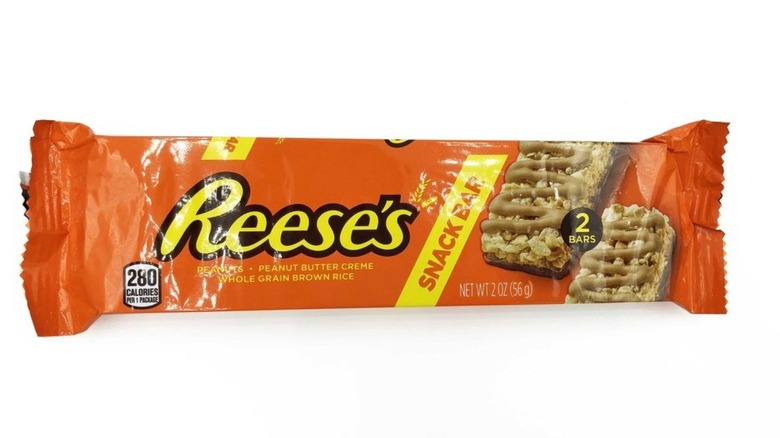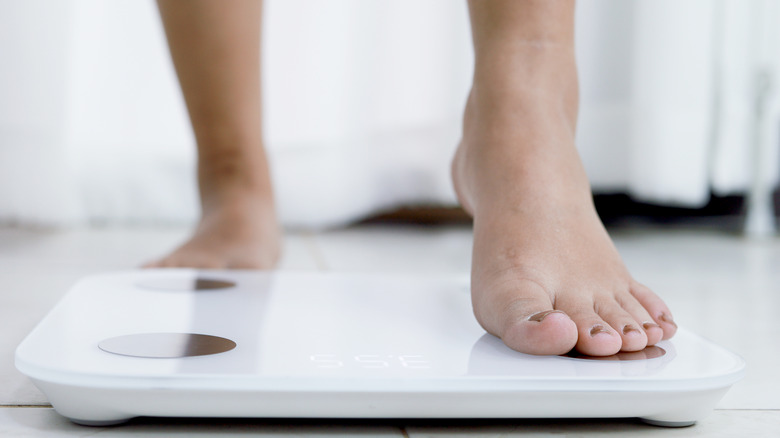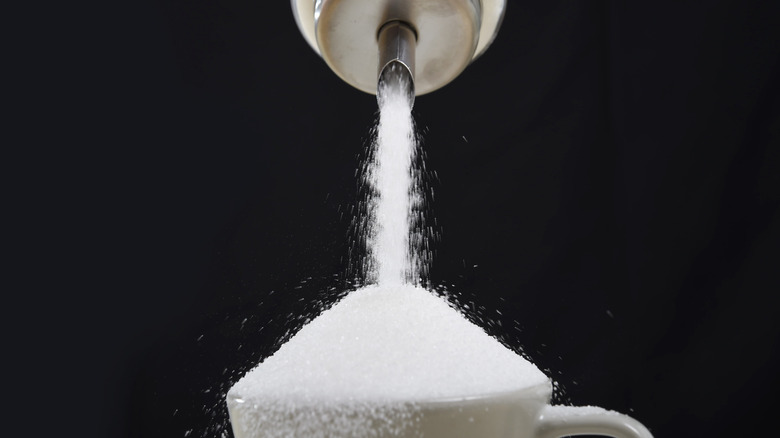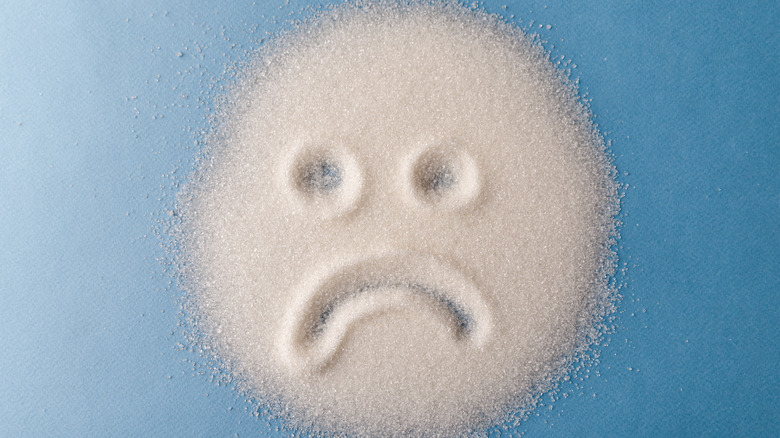What Makes Hershey's Morning Snack Bars So Concerning
Admit it: We've all done it at some time. We've had candy for breakfast. And no, we're not talking about sneaking candy out of our Halloween baskets when we were 12 (although, ok, we've all been there, too). No, we're talking about unapologetically chowing down on a king-sized bar of chocolate that we probably picked up at a gas station to go with our 20-ounce cup of coffee. If candy wasn't meant to be a breakfast food, then why do they put it right next to the counter?
Now Hershey's is trying to legitimize the whole candy for breakfast deal with its new Reese's snack bar. According to the National Association of Convenience Stores, the bar consists of milk chocolate, peanut butter, peanuts, and crispy whole grain rice. Presumably, this last element, the cereal-like rice, must be what makes it a legit breakfast option. (Of course, by those standards, Nestle's Crunch and Hershey's Krackel bars are also breakfast items.) If you're thinking that a sprinkling of cereal will be enough to earn these snack bars the go-ahead from a nutritionist, though, think again. Mashed spoke with Dr. Nicole Avena, a research neuroscientist who authored a book called "What to Feed Your Baby and Toddler." Avena would not recommend that you feed these bars to your baby or toddler, nor would she like to see you eating them for breakfast yourself. Disappointingly, Reese's new offering turns out to be yet another nutritional no-no.
The calories aren't the biggest concern
While Avena admits that she cannot find a product label or nutritional information for this product (and nor can we), she does tell us "If this snack bar is anything like the other bars or 'snack' options they have, it's not a good idea for breakfast." She did tell us something surprising, though, saying, "Calorie-wise, it's not a problem [because] 280 calories is a perfectly fine size for a light meal or bigger snack." The problem, however, lies in the fact that these calories are what she labels as "empty" ones.
"Reese's products," Avena explains, "often are packed with a ton of artificial flavors and colorings, fat, and most of all, added sugar." She does say that the peanuts and brown rice in this bar are relatively healthy as stand-alone ingredients but tells us that "adding sugar chocolate to the mix and 'peanut butter crème' ... not only increases the empty calories, but also the sugar content and fat content."
A not-so-sweet start to your day
Here's a fun fact about your body that you might not have known – interestingly enough, insulin sensitivity is higher in the morning. Okay, so ... ? Well, as Avena explains, this means "if you're going to eat sugar, your body seems to process it a little bit better in the morning versus in the evening (like for dessert)." So does that mean that it's advisable to eat sweet foods for breakfast every morning? No, unfortunately for our sweet teeth, it does not.
According to Avena, the heightened sensitivity isn't so high if you're waking up before you got as much sleep as you wanted – so, we're guessing that holds for at least five days out of the week, if not more. A sleepy body is one that "still has high melatonin levels," and this hormone, Avena says, will tend to suppress the rate at which insulin is processed. "That means," she tells us, "having a sugary breakfast when you wake up early wouldn't be the best idea."
Sugary snacks in the morning can affect food choices throughout the day
How about saving Reese's snack bars for weekend breakfasts, then? Avena throws cold water on this idea by pointing out that "When we eat sugary foods that don't have much other nutritional value to them, they get digested quickly and spike our blood sugar levels. That spike can also lead to a quick drop, meaning that you're hungry soon after." The hungrier we get, she says, the worse food choices we're likely to make. "Also," she goes on to say, "having a sugary breakfast may lead you to just eat more in general. There was a study done in women that showed having a sugary breakfast may lead you to eat more at lunch."
Yet another aspect of excess sugar consumption is that it causes a temporary rise in our levels of dopamine, the feel-good hormone. As Avena acknowledges, 'This can make it really easy to form habits around eating sugary items and make it harder for us to say no." In addition to making us feel good, sugar also helps to provide us with a short-lived energy boost. Avena says that "more often than not, we tend to seek out sugar as a way to get the energy we need to wake up." Of course, when a crash inevitably follows the initial rush, you're likely to wind up tired and cranky and ready for another ride on the sugar roller coaster.



